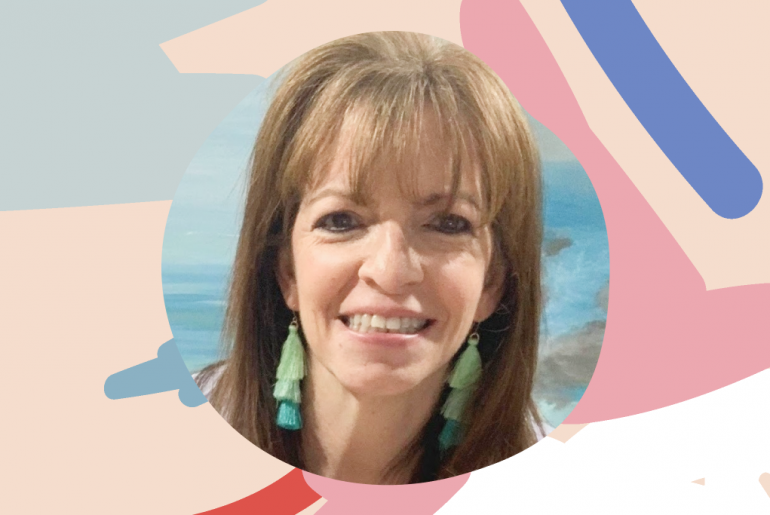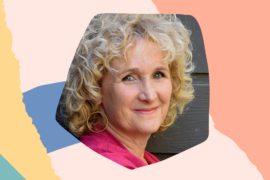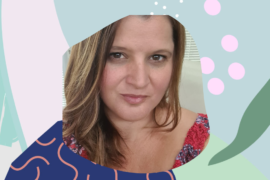Key Takeaways
- Why Debbie was never able to pursue art in school – and the specific request from her boss of 23 years that led her to finally quit her job as a legal secretary.
- The moment of inspiration that showed Debbie that she could have a career in art.
- How Debbie created her first business plan and launched her founding memberships.
- Debbie’s advice for anyone who’s been told that there’s a “logical thing” to do and something they truly want to do – and why almost anything can become the foundation of an incredible business.
Free Give
FREE Guide – Launch & Grow a Profitable Membership Site
Ready to reclaim your time and attract more monthly paying customers? Our step-by-step guide will show you how to build a membership site that turns your passion into recurring profit. Click here to download!Memorable Quote
- “If you have anything that you like, no matter how silly you might think the idea is, just figure out a way that you could help people with it and make it about them and not you and just go for it. Life is way too short.” – Debbie Viola
Episode Resources
Transcript
Read The Transcript
[INTRODUCTION]
Shelli Varela: Sometimes you have to lose everything to find yourself, but oftentimes when you do, you also find your path.
Stu McLaren: There is a big trend brewing that’s revolutionizing the way business is being done. Big companies like Netflix, Amazon, and Apple are jumping on this too but so are thousands of others in all kinds of markets like photography and calligraphy, fitness, finance, meal planning, lesson planning, dog training, and so many more, and they’re doing it by shifting to a recurring revenue model. Hi. My name is Stu McLaren and for more than a decade I’ve been helping tens of thousands of entrepreneurs generate recurring revenue through membership sites. Join our host, Shelli Varela, as she takes you behind-the-scenes to see how these companies are building a thriving tribe that spends with them every single month. Now, let’s get to today’s episode.
[INTERVIEW]
Shelli Varela: Debbie Viola, welcome to the It’s a TRIBE Thing Podcast. How are you?
Debbie Viola: Hi, Shelli. I’m so excited to be here.
Shelli Varela: I’m always jazzed at the stories that we have coming through the door but your story is particularly close to my heart for a number of reasons. You know, we’re going to talk about art and we’re going to talk about the uncovering of what matters. We’re going to talk about 9/11 and all of those things. But the tapestry of your story is an incredible journey. And I’m wondering if you would be so kind to tell everybody, you know, before you were the membership site owner that you are today, who are you and where did your journey originally begin.
Debbie Viola: Okay. Well, I was always interested in art, but I never had the opportunity to take art. I went to a Catholic business high school in Brooklyn, New York, and the guidance counselor wouldn’t let me take art as an elective. She somehow thought that business math would be better suited for me and I was always creative as a kid. I taught myself how to crochet. I’m left-handed so I had to like hold things up in the mirror to see things the right way. So, I was always crafty, but I just never had the opportunity. So, I was always a good student. In high school, I came out typing 120 words a minute and stenography. I don’t know if anybody even knows what that is anymore, but it’s like dictation. It’s like a whole other language like a shorthand. I was just great at those things. So, straight out of high school, I became a legal secretary in New York City. It was just like an hour subway ride away.
And I had a couple of jobs and then my last job I was there for 23 years and my boss started out almost fresh out of law school so we’re both kind of new and I helped him grow his firm to a nine-attorney law firm. I was the office manager. I mean, I just ran the firm for him. I did everything, a little bit bill paying, all the work, everything possible. And he always liked dangled a little bonus in front of me like if you stay until midnight Christmas, you’ll get an extra or whatever. And I was just like a robot. It was the only thing I knew how to do. I was good at it but it certainly wasn’t fulfilling. And as the years went and he made more money and treated me more miserably, I just hated it. But that was all I knew how to do. And by the time I left, we had teenagers. My daughter had just started in private school in New York City and my son was in high school. So, we were going to have two kids in college and I didn’t even think about the possibility of, “Gee, I want to quit and do something else.” I figured if I quit, I would just get another job in a law firm. And what was that going to do because it was still going to be the same thing?
So, I just went on doing the only thing that I knew how to do what I was good at. I’m a practical person and I took what I had to do for our family. And so that was it. And then I was in the city on September 11, 2001. When I got out of the subway at 42nd Street, I heard sirens all over the place and I was thinking, “There must be a really bad fire downtown.” Then I got to the office. It was the 60th floor, the top floor of our building, and everybody was in the conference room and I hear them all screaming. And as I walked in, I saw the second explosion. I didn’t see the actual plane, but we saw the explosion, the ball of fire. And people were telling me that, you know, earlier, they thought a little plane had hit the other building, and now everybody’s on the phone scrambling trying to find out some information. And my boss had a big TV in the office that we were watching TV and then after a while, we knew what had happened that it was a terrorist attack.
My daughter was a freshman at Barnard College, which was about 70 blocks away uptown from where I was, and she called me. She was on the phone hysterical. She woke up to that news, and this was like a first week away from home ever. She was never a kid that went to camp, who had sleepovers or anything. So, she was just hysterical. And she knew that I was not far from the Empire State Building. She was worried that that was the next target. It was just horrific. I felt like I was living like a horror movie. It was so surreal. And to this day, it still feels surreal. Like, how was that possible that that whole thing even happened? It’s hard to explain. So, anyway, my husband and I and my daughter were on the phone trying to figure out what to do. What are we going to do? I didn’t know that I was trapped in the city. But at that time, I was trapped. They locked the city down. And so, my husband and I decided that I was going to leave and get to my daughter, just walk the 70 blocks.
Thank God my days of high heels were over. I had flat shoes on. All I had to worry about was getting contact lens solution from somebody at the dorm and I was just staying with my daughter. But I was still in the conference room at that moment when we decided that and all of a sudden, it was like whatever it was, 10 to 11, we saw the buildings crumble, start to fall and just implode on top of itself and I can’t even explain what that was like knowing that there were people inside the building and right on the streets below and we saw that happen. And my boss of 23 years is screaming, “Oh my God, I think one of his colleagues,” he screamed, “I think he’s in the building and had a meeting.” He was just like frantic and I was like in shock and I’m like, “I got to get out of here. I got to be with my daughter.” So, I’m walking to the elevator. As I walk to the elevator, my boss follows me with work in his hand. He’s like, “Since you’re leaving early, could you do this at the dorm tonight?”
Shelli Varela: Oh, my goodness. Are you kidding me?
Debbie Viola: Oh my God. No, my jaw just dropped open. I couldn’t even believe. I mean, I should have believed it because that just sums up what I put up with for 23 years but like. You’re just screaming that you think your friend got killed. We know there’s people in those buildings that we’re watching perish and all you can still think about is your work.” I was even more shocked.
Shelli Varela: What did you know to be true in that moment?
Debbie Viola: That I was done. I just couldn’t even look at him another second. I mean, he made me so sick and it made me realize like what was I even doing here anymore? How did I put up with this for 23 years? Then I was like getting upset with myself, like what a jerk I was all these years just because that was all I knew how to do. Like, wow, it just gave me such a moment of clarity that I’m done. It felt like financial suicide but that elevator ride down, I just know that I was done and then to get out onto the street and, oh my god, it was like a mass exodus. There were just people just like running uptown. Everybody’s going in one direction. And so, I just joined the crowd and then you keep looking over your shoulder and you see this big, even though it was like a few miles away, all you saw was that big pile of black smoke and you’re praying that it didn’t catch up with you and I just like ran for like 70 blocks to be with my daughter. And the rest of that day was actually a blur. I really can’t even remember what happened. I remember being with my daughter and hugging her. And the next few days, I really don’t even remember what happened.
Shelli Varela: Well, I love what you said there because oftentimes when people are taking a leap, and this is definitely true when people are starting a business or an online business or membership site, there is that moment of it costs you too much to stay somewhere that is incongruent with you and stepping across the precipice to something to possibility. And while it’s frightening, it’s also exhilarating. So, what did that transition look like for you? Because by all accounts, you had been interested in your art your entire life, didn’t see that as a career possibility, even though there was probably some sort of internal dialogue that was like, “Man, but that’s my thing.” For the logical path are super hard working person, put in all of these years, and then you reach that moment, and now you’re stepping off the ledge to be true to Debbie and to do your thing. What was that like and what was the transition like for you into what you’re doing now?
Debbie Viola: Well, the first words that came to my mind was financial suicide. Because that’s just what it felt like. I mean, here I am giving up a New York City corporate job. I mean, it wasn’t millions of dollars, but it was money. My daughter was in a private college. We didn’t get any scholarships because everybody was smart at the school she went to so they didn’t give any scholarships. It was full tuition. It was like a mortgage back then. And I had no plan. I had no business plan. I wasn’t a business person. I was an employee since high school. And here I was 40 years old and 43 at that time I think, and like what do I do now? But I was inspired because what got me started on my journey, we put a new bathroom in the house and I said to my husband, “Let me see what I could do me fooling around with the walls. If they don’t come out well, it’s just paint,” and I wound up doing this beautiful decorative faux finish. And the contractors were like, “You better quit your day job. You’re better than any professional we’ve ever seen.” And I’m like, “Get out of here.” They’re like, “No, look at those corners, the edges. It’s beautiful.”
And that really stuck with me and inspired me and that’s what stuck with me on September 11. You know, when my head got a little clearer when I was thinking about it, like, maybe they’re right. Maybe I can do something with this. And like I said, I didn’t want to just get another job at that moment. I swore that if I could help it, I wouldn’t work for another person but myself ever again. And to this day that I’ve held that to be true, which is awesome. I’m proud of that. It certainly wasn’t easy and it’s still not easy. You never know where your next job is coming from and if you’re an introvert like me, that’s even tougher. You know, I’m not the type of person that just walks up to people and walks into surroundings like, “Hey, this is what I do. This is me.” It just comes very, very hard so it’s always been a struggle.
[ANNOUNCEMENT]
Stu McLaren: So many people in all kinds of niche markets are leveraging their existing knowledge and influence and they’re transforming it into passive monthly income. This isn’t luck. This is a repeatable formula for producing a growing subscription income and if thousands of others can do it, you can too. To find out what type of membership site would be right for your business, visit GetTRIBEGuide.com. Go to GetTRIBEGuide.com and download it today. You’re awesome!
[INTERVIEW]
Shelli Varela: I’m curious to ask you this. So, when you were talking earlier about talking to the guidance counselor and expressing your interest in art, and they were kind of like, “Well, it’s not really a career per se,” and then you went into, you know, becoming a legal secretary and you were doing “what you should do, the logical thing.”
Debbie Viola: Right. Yeah.
Shelli Varela: The taught tried tested and true. You know, you could explain to somebody why you were taking the path you did. What did that feel like when you stepped into what was true for you and actually acknowledge that, that that is the thing that has actually been entirely true for you the whole time?
Debbie Viola: It just felt so right and so natural and like, “Oh my God, I’m loving this.” You know, it was the stress of, “Okay, I have to figure out how to make money from this or else I have to go back and get a job,” because that was my promise to my husband and my family. He’s like, “Look, just give it a shot and we’ll give it a couple of months. And if that doesn’t work then you just have to go get another job. Just go for it.” And I did. So, it’s like, “Okay, what do I do? How do I make money? How do I meet people?” And at the time, I was also like painting on glassware so I painted up some wine glasses and I put them in a basket, put a bottle of wine, and I went to a real estate agency in like a ritzy part of town. And I just walked in and I said, “Oh, I thought maybe these would make nice clothing gifts for your clients.” And then I also have like a little mini album, a portfolio of my bathroom. And at that time, I had also done my sister-in-law’s room in her house.
So, I have like two rooms to show and then I also do decorative painting. And they said, “Okay, thanks very much.” They took my little like car that I had typed up. I didn’t even have professional business cards. But a week later, the realtor that I met with calls me and she says, “You know, I have a dining room in my house that I want to redo and I hate wallpaper. Could you come over and see what you could do with it?” Well, that was like, a $2,000 job and like, oh my God, I felt like maybe I could really do this because after that, her friend had seen it and then like a month later, her friend called me and I did two rooms in her friend’s house. And then I started to feel like maybe I am really onto something. You know, maybe this could work somehow. So, there’s little jobs here and there got me going.
Shelli Varela: Well, I just want to circle back to everybody listening because what I want to point out is you followed your curiosity. It felt a certain kind of way. And then what you did was ask yourself, how and where can I apply this to something that could be a business? Because, again, originally going back to your high school story, they’re like, “No, no, don’t do this. This makes no logical sense.” But instead, you follow your curiosity, paid attention to how that made you feel, and then look for the opportunity based on that. I’m curious to know as you transition from your employee life to now you have this membership site called Creative Connection Painting Club, what was the biggest fear that you had that turned out not to be true?
Debbie Viola: I guess that I couldn’t make it work. Especially like I said, because I wasn’t a businessperson and to this day, the only written business plan I have is a few months ago, my seven-year-old granddaughter sat down with me when I was explaining to her that I’m going to start a painting club because she’s very artistic. She wrote down, open up painting club, invite people to join and I’m like, “Juliana, this is my business plan. This is the first business plan I’ve ever had in the 20 something years I’ve been in business for myself.”
Shelli Varela: How old is she did you say?
Debbie Viola: Seven.
Shelli Varela: Okay. So, for everybody listening out there, literally is out of the mouths of kids.
Debbie Viola: Yes.
Shelli Varela: And I often too, and I’m sure you do as well, hear people saying the reasons they can’t do it or like your guidance counselor saying, “Well, it’s not logical. It’s not possible.” But the truth is people are making lucrative business high-profit, low-stress, recurring revenue businesses in some of the most obscure niches. And it really is as simple as your seven-year-old granddaughter said.
Debbie Viola: Yes. She really opens up my eyes. And as simple as it is, it’s also difficult. Again, if things don’t come natural to you, you have to do all things like social media, grow your audience, and find your tribe, find your people and all that. So, that’s a whole other thing but deep down, if you just have that burning desire to do something and you think you can help people and serve people because now I came to the idea of the membership because, I mean, I’m 61 years old now and while I still climb ladders and scaffolds for my decorative painting job and I feel like I better quit while I’m ahead. And I’m also at the point now where I want to serve people. I mean, I sell art. I do large abstract paintings and I sell art to interior designers, and I love that but it really lights me up to help people and to serve them. And now our lifestyle was changed. We have our two moms, 93 and 97 years old, that live with us.
So, thank God they’re in great physical condition, but basically, I’m a caregiver. I mean, we can’t go out to dinner without worrying about them. We can’t go on vacation. You know, they’ve become our center. It’s like we have two children all over again, two small children. And I know that at the end of the night, I could come down to my basement studio and pull out my paints, put on soft music and in five minutes, I am like golden. You know, all the stress of the day whatever shenanigans and stressful things happens, I just get so lost in my art and what I’m doing. I focus on that and everything else disappears. And I got to thinking, there’s got to be so many other people like that whether they’re caring for a spouse or a sick child off the bed or a parent. Everybody needs an escape. And like I said, I’m fortunate because physically they’re okay, but a lot of people don’t have that fortune and they’re locked in their house 24/7.
So, what could I do for them to help them find some comfort? And the only thing that I know how is art and it works for me and I just want to share it with the world and find my people that I could help.
Shelli Varela: Well, I love that you said find the people that I could help because the truth is there is the membership site that which you do, but there’s also that which it provides and what it gives people and it’s a whole cheaper than therapy. And especially, you know, and I’ve said this so many times at a time when people are feeling so disconnected, it’s the way to be part of something that you have in common with other people.
Debbie Viola: Yes, absolutely. And it’s so funny that you said it’s so much cheaper than therapy because over the years, I’ve also taught art lessons and paint parties long before they even called paint parties. Been doing that about 17 years. And so, many students told me, “Oh, my God, you’re so much cheaper than therapy,” and they laughed about it. But now there’s really scientific proof to back it up that art is very therapeutic and helpful, and all that. So, there’s definitely truth to that. And it’s great.
Shelli Varela: Final question, if there are people listening, which I know this to be true, who are in a position where they think they should do the logical thing, they should toe the line and even though maybe what they’re doing is currently maybe not feeling 100% congruent with who they are, who they want to be, or what’s true in their core, what advice would you give to the people that are maybe apprehensive about following their truth and jumping into trying something new?
Debbie Viola: I just have to say just do it, go for it. And that sounds so cliché, but honestly, that’s how I literally forced myself to do it. And I know this is supposed to be about me and not about you or TRIBE or anything but being at TRIBE Live in August gave me such courage. Listening to you on that stage gave me such courage that the next day I raised my hand when Stu had a question and I spoke and shared my story in front of the thousand people that were there and I was shaking in my boots. But that night before, I think I was up to like 6 AM tossing and turning and like remembering every word that you had said, and I’m like, “What am I waiting for? I keep sitting in waiting. I took the course. I know what I need to do. Just pick a date for God’s sake and do it.” So, my birthday was October 17 like, that’s it. I’m picking my birthday and I just started saying it out loud just so that I would hold myself accountable. And I didn’t do all the things, I didn’t do anything right, I didn’t do an email list, I didn’t do webinars.
All I did was Facebook Lives on my page, Art by Debbie Viola. I would paint and talk about art and like, “Oh my god, nobody’s going to sign up.” And in the end, I had 11 members that are my founding members and, oh my god, I feel like I have 1,000 members, and now they love it. They tell me, you know, I have a stressed out a dentist, an attorney, and they love that they could paint in their pajamas on their own time. And my next step is to biggie size and figure out how to grow this. But in the meantime, I feel like I’ve finally found my calling, and I’m loving it because I’m helping people. So, if you have anything that you like, no matter how silly you might think the idea is, just figure out a way that you could help people with it and make it about them and not you and just go for it. Life is way too short.
Shelli Varela: There are so many people waiting for not just your membership site, but what your membership site offers. And when we don’t do this thing that we’re maybe a little bit frightened to do or doubtful to do, when we don’t do that thing, we’re taking something away from the people who need us because the truth is, yes, there is a definite financial benefit to the membership site owner. There is also a benefit and a responsibility to the people on the receiving end that may never get that gift if we don’t take action.
Debbie Viola: Absolutely. Now, a quick story just about art, like sometimes everything, “Oh, I just paint,” but I also do hand-painted silk scarves and one lady bought one for her grandmother who was in the hospital and the grandmother loved it. And the grandmother has since passed away. And now this woman is going to wrap the scarf around her wedding bouquet when she gets married in June. She sent me a message and I’m like, “Oh my God.” That is really touching like you just never know what your art or whatever your thing is that you do, how it touches somebody into you because you’re so good at it or whatever. You just think, “Oh, but this is just so natural.” Nobody’s going to – you know what I’m saying? Like nobody’s going to have such meaning to take away such meaning of what you do but it really can change lives.
Shelli Varela: Yeah. Sometimes our gifts are hiding right under our nose.
Debbie Viola: Yeah, exactly.
Shelli Varela: Well, if people are looking to contact you online, where’s the best place they can find you?
Debbie Viola: You know my Facebook page, which is Art by Debbie Viola. I’m thinking now I should have had like a landing page, an opt-in, a lead magnet, all that done before this, but of course, I don’t. I have a website but I don’t have anything on my website about what I’m doing. Now. My website is my name DebbieViola.com. But probably my Facebook page I’m the most active.
Shelli Varela: Sounds great. And that’s Debbie with no E? It’s D-E-B-B-I, right?
Debbie Viola: D-E-B-B-I-E.
Shelli Varela: Oh, it is IE? Okay. Perfect. Debbie Viola.
Debbie Viola: V-I-O-L-A. Yeah.
Shelli Varela: Amazing. Thank you so much for your time. Thank you for sharing such a vulnerable story, and we definitely appreciate you.
Debbie Viola: Oh, thank you. I appreciate you more than you know it. Thank you, Shelli.
[CLOSING]
Stu McLaren: I hope you love that story. It’s amazing, right? That’s what It’s a TRIBE Thing is all about. So many people in all kinds of niche markets are leveraging their existing knowledge and influence and they’re transforming it into passive monthly income. Listen, this isn’t luck. There’s a repeatable formula for producing a growing subscription income and each week we’re going behind the scenes to show you exactly how they did it. Get the latest stories and actionable ideas from each episode at www.ItsaTRIBEThing.com and if you know one other person who could benefit from this, tell them to subscribe. Tell them to go to ItsaTRIBEThing.com.
[END]
To learn more and get access to all episodes, visit our podcast page!






